- News
- Reviews
- Bikes
- Accessories
- Accessories - misc
- Computer mounts
- Bags
- Bar ends
- Bike bags & cases
- Bottle cages
- Bottles
- Cameras
- Car racks
- Child seats
- Computers
- Glasses
- GPS units
- Helmets
- Lights - front
- Lights - rear
- Lights - sets
- Locks
- Mirrors
- Mudguards
- Racks
- Pumps & CO2 inflators
- Puncture kits
- Reflectives
- Smart watches
- Stands and racks
- Trailers
- Clothing
- Components
- Bar tape & grips
- Bottom brackets
- Brake & gear cables
- Brake & STI levers
- Brake pads & spares
- Brakes
- Cassettes & freewheels
- Chains
- Chainsets & chainrings
- Derailleurs - front
- Derailleurs - rear
- Forks
- Gear levers & shifters
- Groupsets
- Handlebars & extensions
- Headsets
- Hubs
- Inner tubes
- Pedals
- Quick releases & skewers
- Saddles
- Seatposts
- Stems
- Wheels
- Tyres
- Health, fitness and nutrition
- Tools and workshop
- Miscellaneous
- Buyers Guides
- Features
- Forum
- Recommends
- Podcast
review
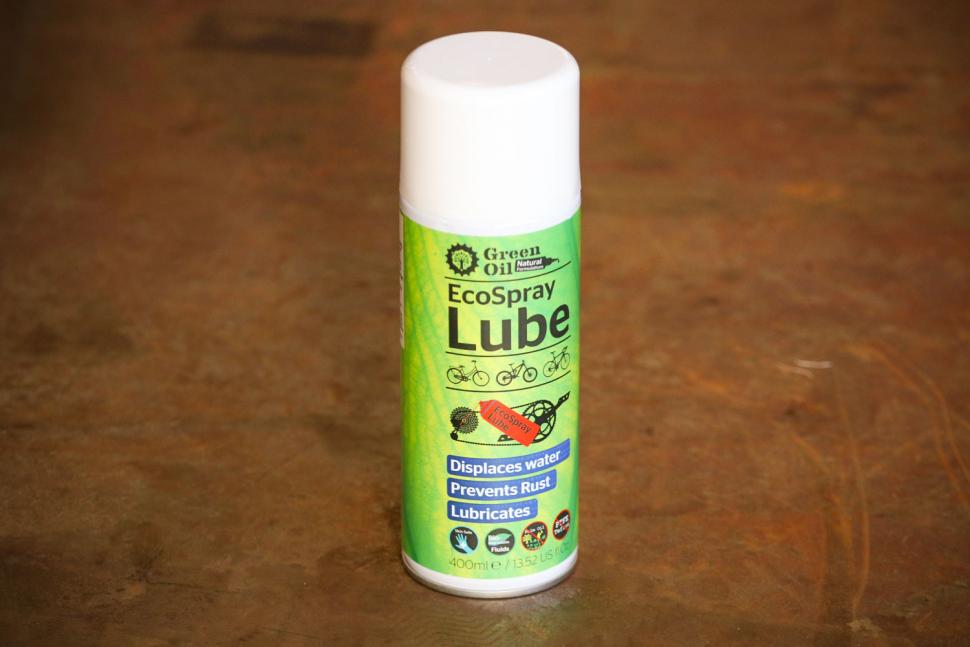 Green Oil EcoSpray Lube
Green Oil EcoSpray Lube£7.99
VERDICT:
Credible alternative to heavy-duty PTFE lubes, albeit pricier than some
Weight:
404g
Contact:
At road.cc every product is thoroughly tested for as long as it takes to get a proper insight into how well it works. Our reviewers are experienced cyclists that we trust to be objective. While we strive to ensure that opinions expressed are backed up by facts, reviews are by their nature an informed opinion, not a definitive verdict. We don't intentionally try to break anything (except locks) but we do try to look for weak points in any design. The overall score is not just an average of the other scores: it reflects both a product's function and value – with value determined by how a product compares with items of similar spec, quality, and price.
What the road.cc scores meanGood scores are more common than bad, because fortunately good products are more common than bad.
- Exceptional
- Excellent
- Very Good
- Good
- Quite good
- Average
- Not so good
- Poor
- Bad
- Appalling
Green Oil EcoSpray Lube is a plant-based alternative to traditional, heavy duty, PTFE-based maintenance sprays, and a very credible – albeit more expensive – alternative to stocky formulas such as B'Twin's All In One Maintenance Spray. However, those looking for a filmy, post-wash water displacer are better served by the likes of GT85 and Muc-Off Bike Spray.
- Pros: Versatile, long-lasting, pleasant to use
- Cons: Better as a protectant/lubricant than water displacer
Exact composition is a closely guarded secret. However, Simon Nash, Green Oil's founder, would say it's made from the same, plant-based stock used in its wet chain lube.
Obviously, to achieve a sprayable consistency Green Oil has needed to boost the (plant-based) solvent content. Some will argue the butane/propane propellent puts a dent in the eco-friendly credentials. Again, I'm assured the quantities employed present minimal impact to planet and user alike.
Like most sprays, it comes with the standard nozzle for broader application and a straw for precision jobs – cables, springs and mechanisms. Giving the contents a vigorous, 30-second shake, then applying to the desired areas mixes solvent and product components very evenly.
Emerging from the nozzle, the rich, honey coloured elixir could almost pass for something like B'Twin's All In One or Weldtite TF2 lubricant spray with Teflon.
Leaving the aerosol marinating in a Pyrex jug of hot water before shaking results in a thinner coating – one better suited to flushing through cable housings, masking electroplated/polished frame ends, and freeing sticky lock mechanisms.
Let us spray…
I've applied the lube to the usual suspects: cleats, old school freewheel and locking mechanisms, garage door rollers, gear and brake cables. Anything arthritic perked up in a matter of engagements. Cleat mechanisms felt super-slick and remained so for almost three weeks, in changeable, often damp conditions.
The spray does result in a filmy patina, thicker than those cultivated in GT85 and Muc-Off Bike Spray, which may be welcomed. Fine when masking electroplated surfaces or chipped paintwork, but you might want to place scrap card beneath exposed cables and give derailleur jockey wheels and pivot points a quick wipe.
Without marinating in hot water, the thicker consistency is great for preventing corrosion in recessed electroplated fasteners, stem, bottle and cable pinch bolts being obvious examples. It's proven sturdy enough for threaded unions such as bottle, carrier and mudguard hardware. In a pinch, it makes an interim grease substitute for hub skewers and seatposts, like titanium or aluminium alloys in steel frames.
Continuing this theme, ours has also proved a passable alternative to basic crude mineral oil/PTFE chain lubes, returning 200 miles from a single (two-layer) application through a predominantly dry period. Useful if you've got up a bit late for the Monday commute and found your chain a bit thirsty.
EcoSpray's solvent content certainly helps liberate reluctant seatposts and quill stems, when accompanied by a swift tap from a rubber mallet, although GT85 and WD40 are more invasive, and thus have an edge in this respect.
Value
Given PTFE-based workshop sprays of varying intensities have been around for decades, direct comparisons price-wise are slightly unfair. However, it's still cheaper than WD40's heavy duty PTFE lubricant.
Conclusion
Green Oil EcoSpray does most things competently and stays put. It's a credible alternative to heavy-duty, long-lasting PTFE-based spray lubes, and is also kinder to rubberised components, people and animals.
Nonetheless, I won't be chucking my water-displacing PTFE sprays away just yet; these are more invasive, so better bets for flushing grit and general grot from cables and displacing water following sudsy bucket washes.
Verdict
Credible alternative to heavy-duty PTFE lubes, albeit pricier than some
road.cc test report
Make and model: Green Oil EcoSpray Lube
Size tested: 400ml
Tell us what the product is for and who it's aimed at. What do the manufacturers say about it? How does that compare to your own feelings about it?
Green Oil says:
"Penetrates
- Lubricates
- Protects
- Prevents rust
Great for bike workshops, large and small.
PTFE accumulates in the environment, and people's body tissue.
Mechanics get the stuff on their hands. We've had bicycle mechanics call us who got sick from using lubricants from our toxic competitors.
Things on your skin, especially oily based products seep in and can cause harm.
To help save people from cancer, dermatitis, and to protect the environment from the PTFE sprayed every day in bike workshops, we created the Green Oil EcoSpray Lube.
What's it for?
Light lubrication, getting rid of water after cleaning your bike.
Suspension forks - if they're old and worn out, and you can't be bothered to get them properly serviced, get some more life from them with EcoSpray Lube.
Hard to reach bits - brake leavers, moving parts on dérailleurs, and more!"
My feelings: Rich mixture makes a very credible alternative to heavy duty PTFE types and its extremely versatile. That said, GT85 and other more invasive preps have an edge when it comes to water displacement. For example, following a sudsy bucket wash or arthritic mechanisms.
Tell us some more about the technical aspects of the product?
Butane/Propane Propellant, plant based solvent. Lubricant made from same plant-based stock as its wet chain lube.
Rate the product for performance:
8/10
Does everything I would expect from a comparable heavy-duty PTFE formula.
Rate the product for durability:
7/10
Thicker, plant-based stock seems to rival if not trump some heavy-duty petrochemical blends I have used, for several seasons.
Rate the product for comfort (if applicable)
6/10
Nicer to use than PTFE formulas. However solvent and propellent components require similar cautions.
Rate the product for value:
5/10
More expensive than some more basic heavy-duty PTFE based lubricants but cheaper and definitely longer lasting than some popular bike-specific blends.
Tell us how the product performed overall when used for its designed purpose
A versatile and long lasting alternative to traditional heavy duty PTFE-infused formulas, but there are better options for post-wash water displacing. Delivering a thinner layer is easily achieved by standing the aerosol in a tub of hot water first.
Tell us what you particularly liked about the product
Versatile. Can be used as a lightweight internal frame preserve and mothballing agent on electroplated surfaces. Favourable longevity, less impact on rubberised components. Passable "in a pinch" chain lube too. However, stick to WD40 Multi Use and similar if you're tackling corroded battery contacts (such as those found in older LED lights) or flushing saturated electricals.
Tell us what you particularly disliked about the product
Nothing, given the overall design brief and specification.
How does the price compare to that of similar products in the market, including ones recently tested on road.cc?
Given PTFE has been around for decades, it's not surprising to find these formulas are much cheaper. However, it's cheaper than WD40 Specialist High Performance PTFE Lubricant.
Did you enjoy using the product? Yes
Would you consider buying the product? Yes
Would you recommend the product to a friend? Yes
Use this box to explain your overall score
Performance rivals that of some heavy-duty PTFE blends I've used, though it's pricier – a consideration if money is your bottom line.
About the tester
Age: 45
I usually ride: Rough Stuff Tourer Based around 4130 Univega mtb Frameset My best bike is: 1955 Holdsworth Road Path and several others including cross & traditional road
I've been riding for: Over 20 years I ride: Most days I would class myself as: Experienced
I regularly do the following types of riding: cyclo-cross, commuting, touring, fixed/singlespeed, mountain biking
Shaun Audane is a freelance writer/product tester with over twenty-eight years riding experience, the last twelve (120,000 miles) spent putting bikes and kit through their paces for a variety of publications. Previous generations of his family worked at manufacturing's sharp end, thus Shaun can weld, has a sound understanding of frame building practice and a preference for steel or titanium framesets.
Citing Richard Ballantine and an Au pair as his earliest cycling influences, he is presently writing a cycling book with particular focus upon women, families and disabled audiences (Having been a registered care manager and coached children at Herne Hill Velodrome in earlier careers)
Latest Comments
- Freddy56 3 hours 56 min ago
The reflective nature of the fabric structure, in in a 2 layer sealed fabric-means moisture cannot pass thru, The breathability claim is lies.......
- HoarseMann 5 hours 8 min ago
Driver injured after car flips onto its roof https://www.bbc.co.uk/news/articles/cy0g9rpp8x9o
- mark1a 5 hours 26 min ago
I don't think he wants to talk about it...
- Rendel Harris 5 hours 55 min ago
Ach, dinnae fret...
- Matt Page 6 hours 3 min ago
The Prevelo Alpha Three on the main feature image is 20".
- eburtthebike 6 hours 15 min ago
£100 bonus.
- chrisonabike 6 hours 23 min ago
To be fair if this is our usual revenant they've got form in rewriting history...
- chrisonabike 6 hours 25 min ago
"At the going down of the sun, and in the morning, we will remember them ... we have to because some numpty destroyed the roll of names"....
- hawkinspeter 8 hours 29 min ago
Looks like some Barton Hill residents don't want the Liverpool Neighbourhood or at least not Marsh Lane to be a no-through-road:...
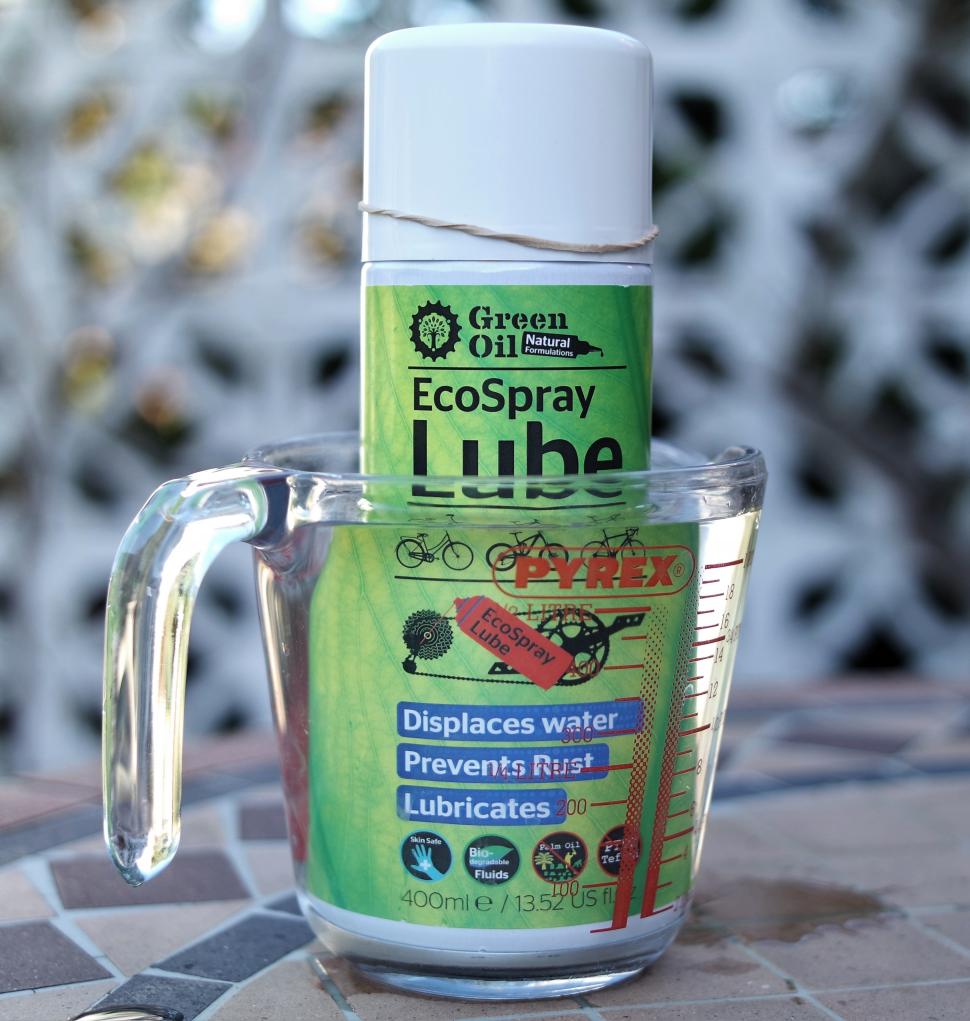


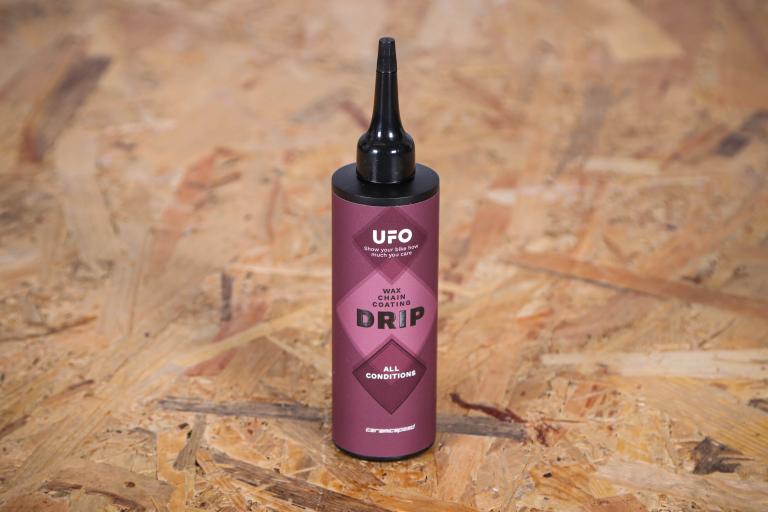
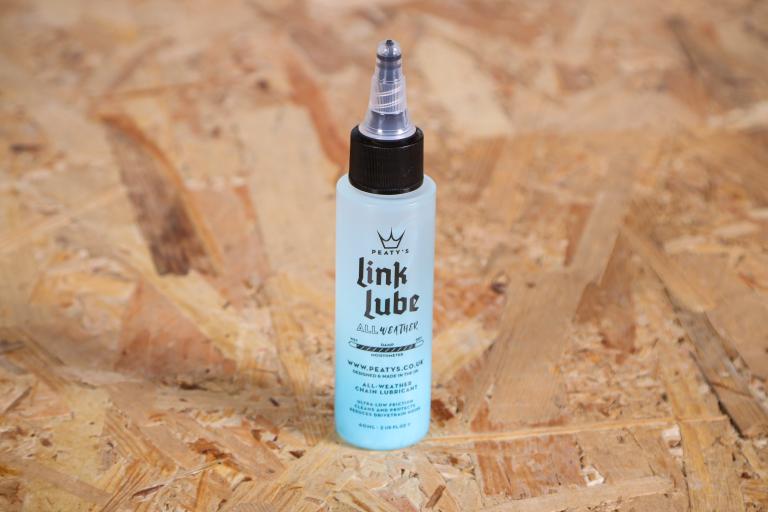
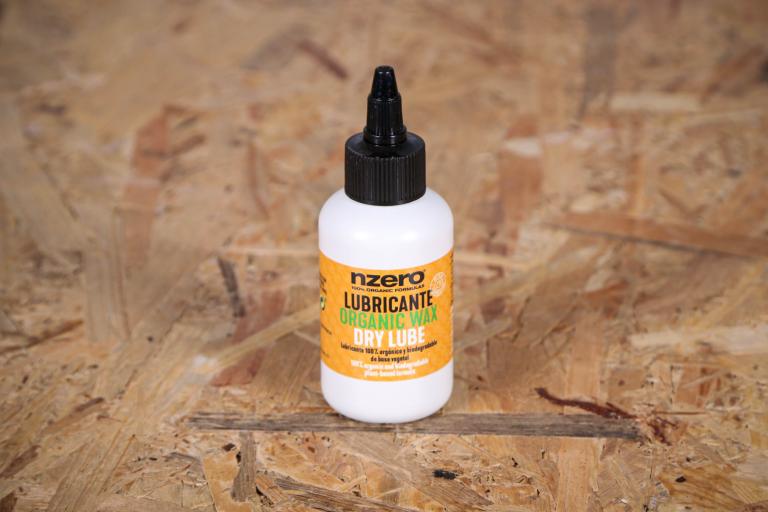
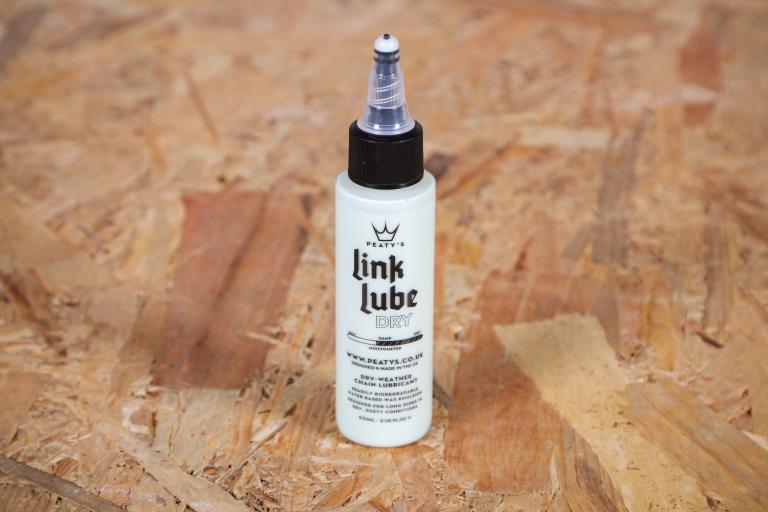
Add new comment
4 comments
*Web page error duplicate*
The worst lube I have ever used. Incredibly messy and collects dirt like a magnet. Since I used only once I thought I would reassign to household items. Applied to some clippers which as a result were glued inoperable the next time I used them. In the bin now.
As a long term fan of Green Oil chain lube, I bought a tin of this and use it as a chain lube. It's thinner than the original so requires more frequent application but it's doing the job well enough. Until I read this review I'd not thought of using it for anything else.
I'm very wary about using vegetable based lubes.
IME it depends on the application. I don't usually stick a lube like this inside brake and gear cables because it will go sticky as it dries, but it seems fine for a chain.
I don't worry about using petro- based lubes
If I was a shop mechanic I'd not want that stuff on my skin every day, dermatitis can result from contact with those compounds. And as the production process for Green Oil is far less environmentally damaging than any petrochemicals the pollution & contamination issues don't just apply to the end user.
I'm very wary about using vegetable based lubes. vegetable oil resinifies into a hard rubbery gunk that's a nightmare to get off after a few months of exposure to air. I gave up using Muc-off lube because f you left it on your chain and came back to the bike a few months later, it would have turned hard and nasty. I don't worry about using petro- based lubes, there are bacteria and fungi in any normal soil that can break down the tiny specks of oil that might fall off a normal bike.